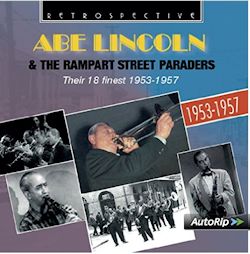1. South Rampart Street Parade
2. I Ain't Gonna Give Nobody None O' This Jelly-Roll
3. Black And Blue
4. The Sheik Of Araby
5. Paducah Parade
6. Sugar
7. Hindustan
8. When I Grow Too Old To Dream
9. A Ghost Of A Chance
10. Oh, Baby!
11. I'm Gonna Sit Right Down And Write Myself A Letter
12. After You've Gone
13. When It's Sleepy Time Down South
14. March Of The Mustangs
15. Peruna
16. Dallas Blues
17. Ida, Sweet As Apple Cider
18. Shim-Me-Sha-Wabble
Clyde Hurley and John Best (trumpets): Abe Lincoln )(trombone): Matty Matlock (clarinet): Eddie Miller (tenor saxophone): Joe Rushton (bass saxophone):
Stan Wrightsman (piano): George Van Eps (guitar): Phil Stephens (bass): Nick Fatool (drums): Tracks 17 and 18 by ‘Matty Matlock and his Dixie Men’ same
personnel except Dick Cathcart (trumpet), Al Hendrickson (guitar) replaces Van Eps and no Joe Rushton
Recorded 1953-57 [79:54]
Retrospective has a trio of disparate trombonists on its books in the shape of Jack Teagarden, Wilbur De Paris, and George Chisholm. Now it adds another in
the shape of Abe Lincoln, best known for his sterling work on the Bobby Hackett-Jack Teagarden Coast Concert LP, in which he failed to sound
overawed by his great ‘bone colleague.
This single-disc retrospective fillets several LPs made by the Rampart Street Paraders –Jam Session Coast to Coast, Rampart and Vine, Dixieland, My Dixieland, Texas! (USA) and then, under Matty Matlock’s name, a couple of tracks from Dixieland. The Paraders were a fine small band – how could that not be the case with Matlock, Eddie Miller, George Van Eps and Nick Fatool in the
ranks alongside other confreres. The repertoire was largely solid pay-the-rent fare but the solos were good, Lincoln’s being gutsy and punchy and full of
brio. Trumpeter Clyde Hurley had a strong rich-toned lead, owing a lot to the example of Harry James, something to Bunny Berigan, but also, in Black and Blue, showing a Wild Bill Davison lineage. It wasn’t a Sturm und Drang band – The Sheik of Araby is a facetiously serio-comic
number – but when Miller soloes the expressive and stylistic range raises several notches. Sugar invariably brings out the best in
Dixieland-Chicago style bands and this example is no exception. Van Eps takes a fine solo, Miller an even finer one. Meanwhile Lincoln unveils his virtuoso
exhibition of animal noises in Hindustan whilst Joe Rushton emerges to take a subterranean bass saxophone solo on When I grow Too Old To Dream.
Oh, Baby!
from the Dixieland, My Dixieland album of June 1954 is a Condonesque blowing session whilst in After You’ve Gone, Rushton evokes Adrian
Rollini to good effect. The vibe turns decidedly jolly in the three tracks from Texas! (USA) helped by the addition of trumpeter John Best to add
greater ballast to the horns. The tuba in Peruna – it’s not listed in the personnel notes in the booklet – adds a rather lumpy parade feel. On
balance these are the weakest, least convincing, and representative tracks. For the last two pieces, Matty Matlock was the leader and trumpeter Dick
Cathcart replaces Hurley (and Best). Ever-excellent annotator Digby Fairweather, who should know about these things, reckons Cathcart one of the most
underrated trumpeters ever to have recorded. My own choice is Joe Thomas, but I’m not here to quibble, and Cathcart’s amalgam of Hackett and through him
Beiderbecke proves highly effective. He’s a truly lyrical player with a fine tone - a little short-breathed at first, perhaps, in Shim-Me-Sha-Wobble, but excellent after that.
So it’s not just the stirring Lincoln but several other eminent players that give this album its special quality. It’s good to be reminded of Lincoln’s
ensemble and soloistic qualities and if the music stays on the lighter side of the river, plumbing few real depths, then that’s more to do with tune
selection and ethos. Sometimes it’s good just to kick back and have fun. Excellent transfers, by the way.
Jonathan Woolf
See also another review by Bruce McCollum
